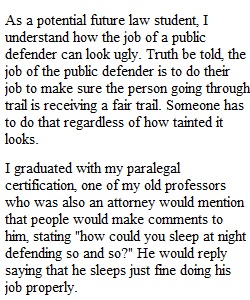


Q Lecture slide #27 discusses "job crafting". In particular, cognitive crafting refers to changing the way people think about their jobs. This can be especially useful for those who work in “dirty” or “stigmatized” occupations (i.e., jobs that are perceived as disgusting, distasteful, or degrading). Below are 4 examples of “dirty” jobs in which people are mostly likely to engage in cognitive crafting. Carefully think about each example – how do you think these workers view their jobs (in other words, how can they change their thinking in order to make the job seem “better” and less “tainted”?) 1. Exotic dancer/entertainer 2. Public defense attorney (defends criminals, even those they know have stolen, assaulted, or murdered others) 3. Animal researcher (conducts research and experiments on animals; tends to get a lot of bad propaganda from animal rights groups) 4. Tabloid reporter Please don’t answer all of them in one response. Focus on ONE job and let your classmates share their views on others.
View Related Questions